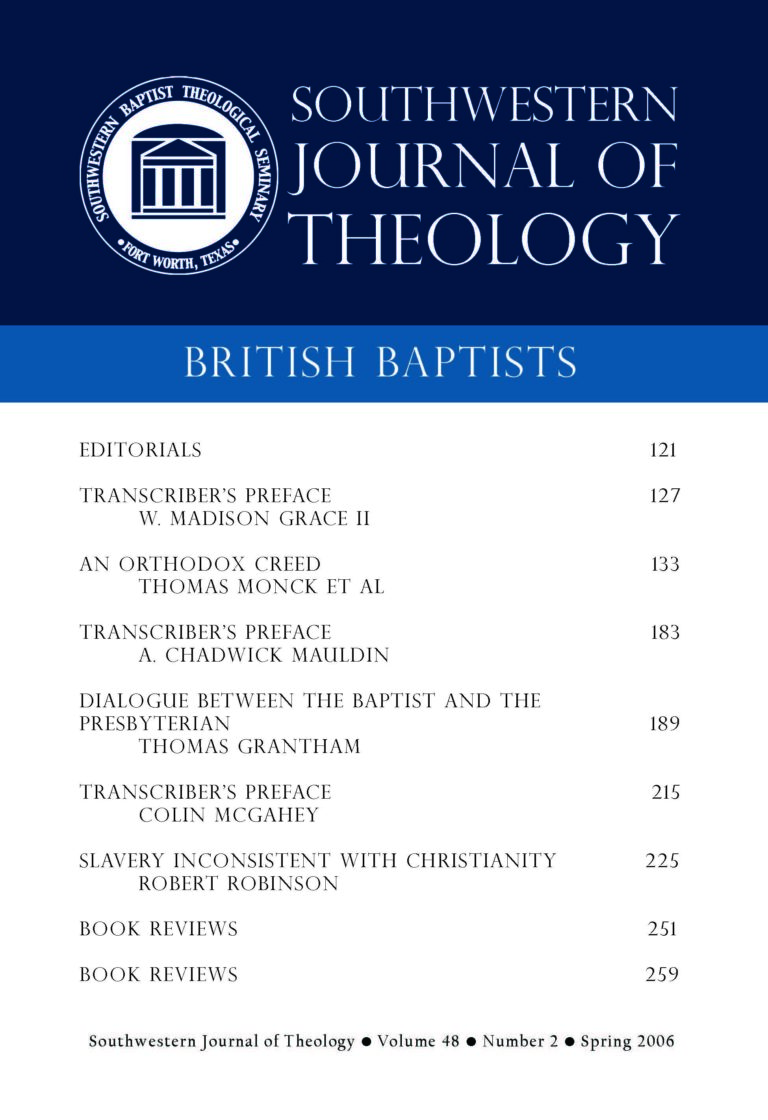
British Baptists
Southwestern Journal of Theology
Volume 48, No. 2 – Spring 2006
Managing Editor: Malcolm B. Yarnell III
Edited by Tomas White, Jason G. Duesing, and Malcolm B. Yarnell III. Nashville: B&H Academic, 2007. ix + 195 pages. Softcover, $15.99.
Thomas White, Jason Duesing, and Malcolm B. Yarnell III edit this volume that contains contributions from leading scholars in Southern Baptist life, including Paige Patterson, president of Southwestern Baptist Theological Seminary; Richard Land, president of the Southern Baptist Convention’s Ethics & Religious Liberty Commission; Daniel Heimbach, professor of Christian ethics at Southeastern Baptist Theological Semi- nary; and Paul Pressler, retired member of the Texas legislature, district court judge, and justice for the 14th court of appeals. This work arose from the first annual conference in the Baptist Distinctives Series held at the Riley Center at Southwestern Baptist Theological Seminary in September 2005.
As indicated in the title, this book seeks to discuss the Baptist perspective on religious liberty, especially as it relates to the freedom established in the First Amendment. The contributors provide theological, historical, philosophical, cultural, and legal arguments for the Baptist understanding of religious liberty. In addition, the contributors seek to remind “Baptists in the twenty-first century of the price that was paid by their forefathers for the establishment and defense of religious liberty” (4).
The book contains several excellent chapters on the development of religious liberty in Baptist thought. One major strength presented by this work is the theological development of the concept of religious liberty. While some would say that the concept of religious liberty is grounded in the social order, Barrett Duke, vice president for research and director of the Research Institute of the Ethics & Religious Liberty Commission, and Paige Patterson offer a theological foundation for such liberty. Patterson traces religious liberty in relation to the exclusivity of Christ. His conclusions are pertinent for contemporary American culture, which faces the dilemma of trying to provide freedom while maintaining a status of “po- litical correctness.” Patterson notes, “Christians embracing the exclusivity of Christ as the only saving and accurate expression of the true and living God are properly the most effective advocates of absolute religious liberty”(46). He accurately depicts Christians who believe in the exclusivity of Christ as ones who would have a strong desire to see religious liberty for all religions because it would allow for the opportunity of non-believers to come to faith in Christ without governmental persecution.
Another strength of the work is how it traces the historical development of religious liberty and the involvement of Baptists in promulgating this liberty. White, Yarnell, and Land provide a thorough historical perspective of religious liberty in early Baptist traditions, the Southern Baptist Convention, and the founding development of America, respectively. Their contributions to the volume are crucial for a proper understanding of the development of religious liberty from the days of the Anabaptists through the founding of the Southern Baptist Convention. As a result of their work, one can see how Baptists played a role in shaping culture in the area of religious freedom.
Heimbach’s chapter on the difference between religious liberty and religious autonomy is the “city set on a hill” for this book. His work delineating the value, views, and recipients of religious liberty is worth the cost of the book itself. Heimbach opens by warning his readers, “It is difficult to have a casual discussion of religious liberty because discourse on the subject is highly charged and rightly so” (125). He then proceeds to apply the paradigms of ordered versus autonomous and institutional versus individual to the concept of religious liberty. Heimbach states, “Ordered liberty is a concept of freedom that is restrained by moral obligations” (133). In contrast, autonomous liberty has “no limitations, no responsibility, no ac- countability” (134). Next, he applies these two concepts to institutions and individuals. Ultimately, he promotes the concepts of ordered liberty for institutions and individuals as a proper understanding of religious liberty because they strengthen society. Heimbach concludes, “When a government hinders ordered religious liberty, it cannot be stable, and it eventually destroys itself because it loses the respect and support of the responsible, public-minded segment of its citizenry that produces and strengthens social cohesion” (142).
First Freedom provides an insightful look at the theology, history, and cultural implications of religious liberty. Written primarily from the Baptist perspective, this work provides a unique understanding of how Baptist doctrine and belief has shaped government and culture regarding religious freedom. The book demonstrates the role Baptists have played in the development of this concept in Western thought and informs Baptists of the challenges they may face in protecting this liberty in the future.





